PM: 'We cannot continue with Christmas as planned'published at 17:22 GMT 19 December 2020
In case you missed it, here is video of the PM's announcement about the Covid rules tightening.
Relaxation of Christmas Covid rules scrapped for much of south-east England as tier four restrictions announced
And people in England in tiers one to three can only mix indoors on Christmas Day
Festive bubbles in Scotland and Wales also restricted to just Christmas Day
PM says spread in cases 'being driven by the new variant of the virus'
Wales brings forward lockdown to start from midnight
Nicola Sturgeon announces travel ban between Scotland and rest of UK from Boxing Day
Northern Ireland lockdown to start on Boxing Day
A second vaccine is being rolled out in the US after regulators approved a jab developed by Moderna
Italy has ordered a nationwide lockdown over much of the Christmas and New Year period
Sarah Collerton, Dulcie Lee, Penny Spiller and Owen Amos
In case you missed it, here is video of the PM's announcement about the Covid rules tightening.
During the press conference, Sir Patrick Vallance, the government's chief scientific adviser, was asked about the origins of the new fast-spreading variant.
He said "viruses mutate all the time, there are lots of mutations around the world, this one is a particular constellation of changes which we think is important".
We think it may be in other countries as well, he says, but there's a large outbreak in the UK - "it may have started here, we don't know for sure".
He says it's important that the "sequencing effort", to find out what is changing, is looked at at a global level.
"It's an important part of surveillance going forward," he says.
We will bring you a round-up of the press conference shortly.
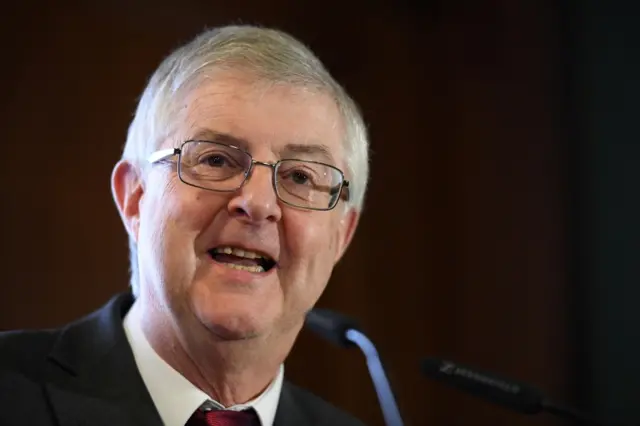 Image source, Reuters
Image source, ReutersThe whole of Wales is to be placed under lockdown from midnight with festive plans cancelled for all but Christmas Day.
First Minister Mark Drakeford made the announcement after urgent talks with ministers over a new variant of coronavirus.
"We know that 2021 will be a different and a better year. Our economy will recover. Christmas will come again," he said.
 Nick Triggle
Nick Triggle
Health Correspondent
The steep increase in the proportion of coronavirus cases linked to this new variant is strong evidence that it is driving transmission.
In London 28% of cases were as a result of this new mutation in mid-November, but that has now increased to more than 60%.
It explains why during the second lockdown cases started increase in London, while in Kent the tier three measures appear to have had little impact in recent weeks.
As chief medical adviser Prof Chris Whitty says this is a bad moment, but there is also some hope.
The prime minister announced 350,000 people had been vaccinated so far in the first two weeks of the programme.
In the coming weeks the number of GP-led vaccination clinics should increase six-fold, while approval of a second vaccine made by Oxford University could pave the way for mass vaccination centres to be set up in sports stadiums and conference centres.
That could see two million people a week being vaccinated.
With 12 million over-65s, in a matter of months this could become to feel very different.
But for now the slog of the pandemic continues - and for many it just got harder.
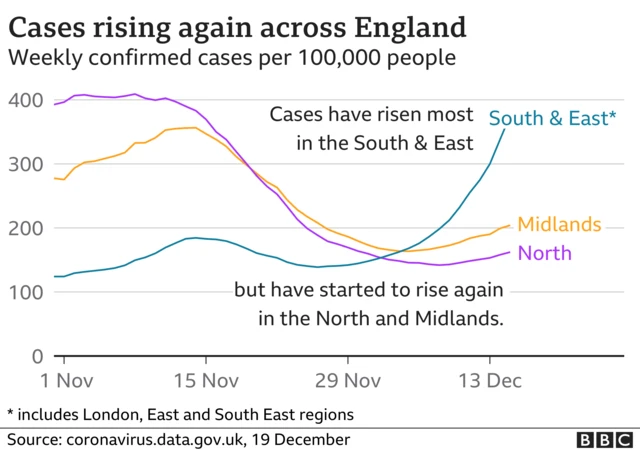
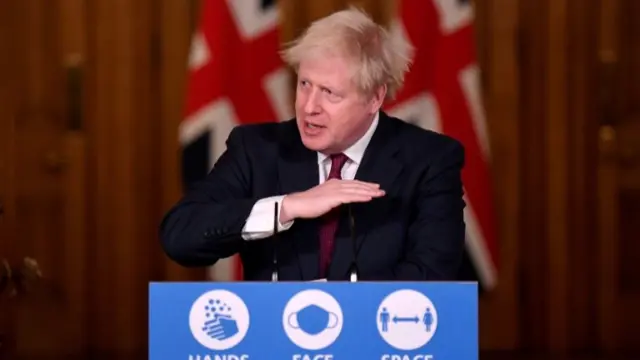 Image source, PA
Image source, PAThe final question is from Anna Mikhailova from the Mail on Sunday, who asks how the prime minister expects people to follow the rules when they keep changing.
Boris Johnson says: "What has changed is the velocity of the transmission, our understanding of how fast this disease is transmitted and the susceptibility of people to getting it."
He says the government will do everything it can to look after jobs, businesses and livelihoods.
"This is a race and we still are doing our absolute level best to protect the public whilst we know that the vaccine is arriving," he says.
"I'm very, very confident... that we'll get that vaccine into a significant proportion of the population by the spring and that things will be radically different for our country by Easter."
And that marks the end of the press conference.
Nigel Nelson from the Express asks what a "short" meeting means in tiers one two and three: seeing granny for a cup of tea for an hour, a two-hour Christmas lunch or four hours of falling asleep "in front of the telly"?
Prof Whitty says: "Keep it small, keep it short, keep it local, and remember the vulnerable are vulnerable."
If you're seeing your grandmother, he says, minimise contact, keep it at a distance, and keep it for a short period.
You want to get to the point where your grandmother has been vaccinated, taking the risk right down, he says.
Sir Patrick Vallance adds: "Assume you might be infectious."
The prime minister says it "can't be stressed enough" that a lot of transmission is asymptomatic.
 Nick Eardley
Nick Eardley
Political correspondent
The announcements we’ve just heard are for England only. But I’m expecting a tightening of restrictions in some other parts of the UK too.
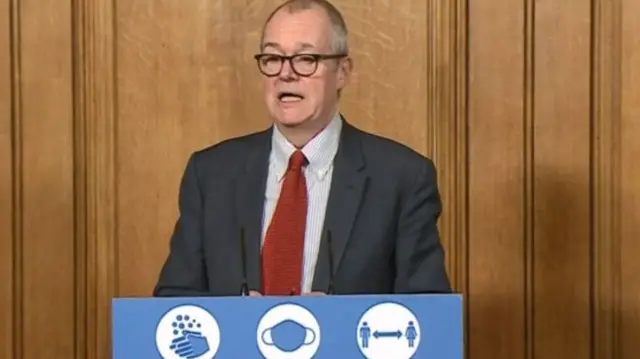
Christopher Hope from the Telegraph asks why the UK has been impacted by this variant of the virus so badly, which other countries have, and how did it "get here".
Sir Patrick says viruses mutate all the time: "This one is a particular constellation of changes which we think is important."
"Every time a virus replicates, it can make a mistake and so some of these things just arise by chance. The question is what advantage it gives the virus and this one seems to have given the advantage of transmissibility.
"We think it may be in other countries as well. We think there's a large outbreak in the UK, it may have started here, we don't know for sure."
Sam Coates from Sky News asks the prime minister what he would say to people who now face spending Christmas alone.
The PM says elderly people or lonely people will have the "consolation" of being able to form bubbles with other households - the rules around forming bubbles hasn't changed.
He adds that he "bitterly regrets" that strict measures are necessary, and that he knows how much "care and thought" goes into preparations.
But he says this is the year to "lift a glass to those who aren't there" - knowing there will be a "better chance they will be there next year to celebrate with you".
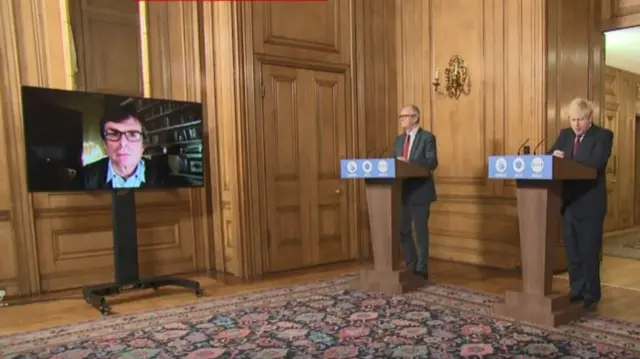
Robert Peston from ITV asks whether this is the "worst moment of the epidemic" as he says Prof John Edmunds from scientific advisory group for emergencies (Sage) has just told him.
Prof Whitty says: "Is it the worst moment? Well I'm afraid there have been so many terrible moments in this epidemic. This is another one.
"But I have to say in my own view this is not the worst moment in the epidemic [because] although this virus is more transmissible... we do have medical countermeasures.
"If you think back to the dark days at the end of March and April... we had no vaccines on the horizon."
There is a prospect in the "medium-term future" where things could be "quite a lot better", he says.
Sir Patrick says "this is a horrible moment for sure", but says we know what needs to happen to slow transmission.
"Reduce contacts, do the basics: face, hands, space," he says.
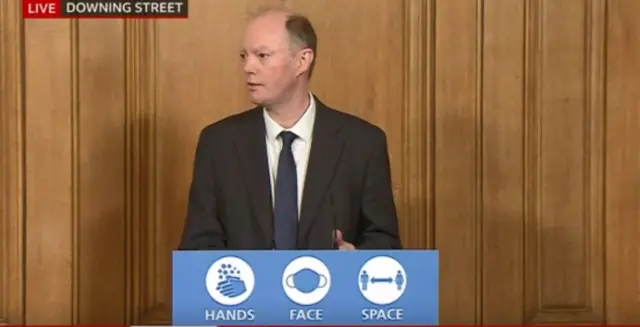
Prof Chris Whitty reiterates that there has been a "dramatic increase" in the proportion of cases that come from the new variant in certain areas.
And he says the places with the variant have had higher increases in hospitalisations - a 36% increase in eastern England, 34% in London, and 28% in south-eastern England.
If you go to the North West, North East, and Yorkshire, he says, there has been no increase in the hospitalisation rate - and that matches lower rates of the new variant.
In Yorkshire and the Humber, he says, the new variant amounts to just 5% of cases.
 Nick Eardley
Nick Eardley
Political correspondent
The government’s view on what is necessary over Christmas has changed considerably over the last 72 hours.
After emergency talks last night and this morning, minsters have concluded they need to introduce significant extra restrictions very quickly.
Boris Johnson has just announced measures will have a considerable impact on the festive period across England.
Tier four was something many ministers resisted. But the data has clearly changed minds.
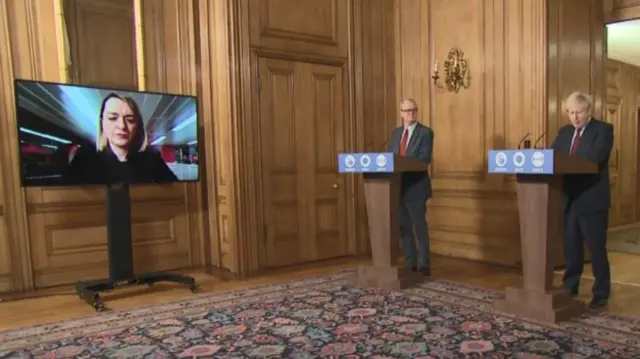
The BBC's Laura Kuenssberg asks why the prime minister has changed his plans - just three days after saying it would be "inhuman" to "cancel Christmas".
The PM replies that "we bitterly regret" the situation, but "when the facts change, you have to change your approach".
The speed of transmission of the new variant, he says, is not possible to ignore.
"When the virus changes its method of attack, we have to change our method of defence," the PM says.
Questions from the public now and Laura from Worthing asks why people who are shielding are still expected to work in tier three.
Boris Johnson says those who are vulnerable "should of course take every step to protect themselves", adding: "I hope very much that you're not being asked to work if you're shielding."
Prof Whitty says shielding is being reviewed, but the model was changed from the first wave as it also had unintentional harmful consequences.
He says experts are looking to get "the optimal balance between isolating people too much and isolating them enough from the virus".
Mike from Cheshire asks whether the number of people who can have the vaccine can be added to the daily figures.
Mr Johnson says 350,000 people have so far had the first dose of the vaccines and says people will be kept "regularly updated".
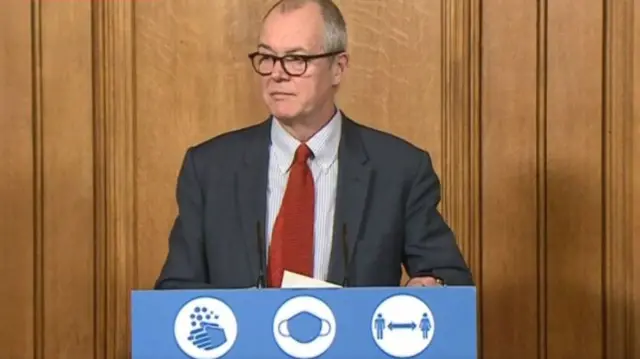
Sir Patrick says the new variant was first seen in mid-September in London and Kent. He says by December it had become the "dominant variant" in London - as this chart shows.
In the week beginning 18 November, the variant accounted for around one in four cases in London, the South East, and eastern England.
By the week beginning 9 December, that had risen to 62% in London, 59% in eastern England, and 43% in the South East.
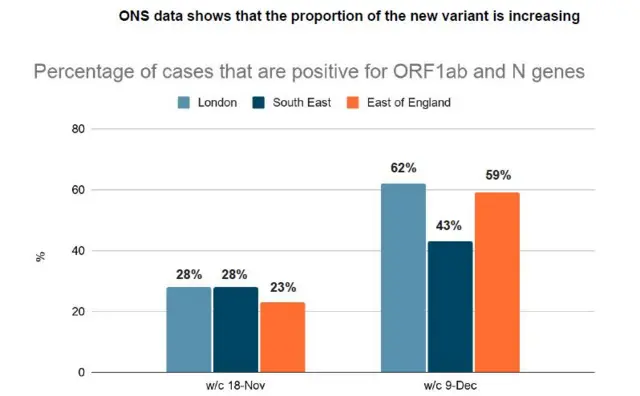 Image source, COBR
Image source, COBRThe government's chief scientific adviser, Sir Patrick Vallance, presents a series of charts to justify the government's decision to introduce tier four in London, the South East, and eastern England.
This slide shows how the average number of cases has increased since late November. The darker the areas, the higher the increase...
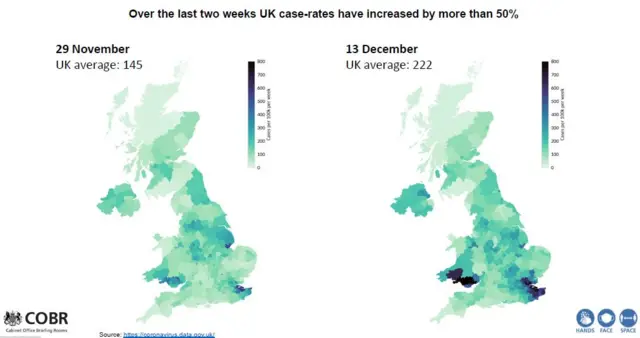 Image source, COBR
Image source, COBR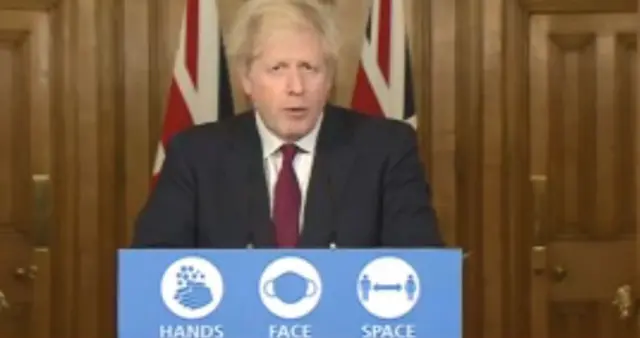
"We cannot continue with Christmas as planned," Boris Johnson says.
People should not travel into a tier four area, though support bubbles remain unaffected as do the exemptions for separated parents and their children.
For those in tiers one, two and three, rules allowing up to three households to meet will now be limited to Christmas Day only.
Christmas bubbles for those in tiers one to three will not be able include anyone in tier four.
In tier four, people should not mix with anyone outside their own household, apart from support bubbles.
London, the South East and East of England will enter a new tier four level of restrictions from tomorrow morning, the prime minister says.
These will be broadly equivalent to national restrictions which were introduced in England in November, Boris Johnson says.
Residents in those areas must stay at home, with limited exemptions. Non-essential retails and indoors gyms must close.
People should work from home when they can, and should not enter or leave tier four areas. Communal worship may continue.
The restrictions will last for two weeks and will be reviewed on 30 December.
The prime minister says the spread of the virus in many parts of south-east England is now "being driven by the new variant of the virus".
Boris Johnson reiterates that there's no evidence that it causes more severe illness or higher mortality.
"It may be up to 70% more transmissible than the old variant," he says, adding that it's early data and subject to review.
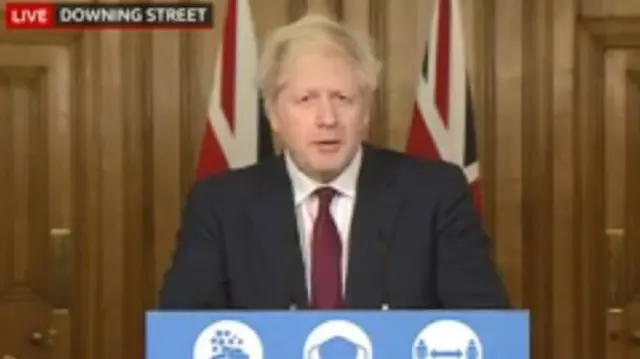
Prime Minister Boris Johnson is at the podium now.
He's flanked by the UK's chief scientific adviser, Sir Patrick Vallance, and England's chief medical officer, Prof Chris Whitty.
He's expected to outline new Covid rules for England amid concern over a new variant of the virus and increasing cases across the nation.
Stay tuned as we bring you all the details.